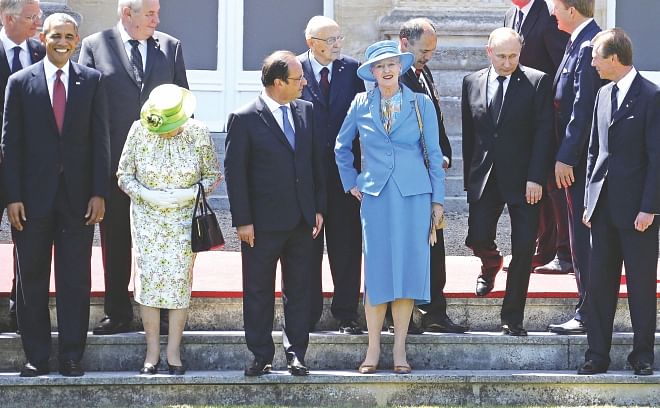D-Day spirit ignites hope
D-Day spirit ignites hope

Russia and Ukraine appeared to have made a long-awaited breakthrough in efforts to resolve a damaging crisis in their relations after conciliatory talks on the sidelines of Friday's D-Day anniversary ceremonies.
Vladimir Putin and Ukrainian president-elect Petro Poroshenko embraced the spirit of the day that signalled the end of World War II by announcing they would jointly seek a ceasefire in the conflict between government forces and pro-Russian rebels in southeastern Ukraine.
The two leaders shook hands and talked for a quarter of an hour in a meeting brokered by French President Francois Hollande before a lunch of world leaders attending the D-Day events.
A series of positive commentaries on the encounter followed from both Kiev and Moscow, raising hopes of a peaceful de-escalation of a crisis that erupted when Russia annexed Crimea in March and sparked a damaging chill in its relations with western powers.
The rift with the West looked to be healing too as Putin had his first face-to-face encounter with US President Barack Obama. US officials styled the meeting as an informal chat but Putin portrayed them as "substantial" discussions.
Putin told Russian TV that Poroshenko had the "right approach" to ending the crisis while the Ukrainian president-elect, who is due to be inaugurated today, said he believed there was a "good chance" of a successful dialogue with Moscow.
Putin revealed that the two countries were close to a deal on the vexed issue of Russian gas supplies to its former Soviet partner.
Russia indicated it would send an ambassador to Kiev for Poroshenko's investiture in what will be seen as de facto recognition of the new president's legitimacy.
A ceasefire could be harder to deliver as, for it to be accepted by the rebels, there would have to be some sort of pullback by Ukrainian government forces which Kiev would regard as an infringement of its right to police all of its sovereign territory as it sees fit.
Tensions in southeastern Ukraine have mounted in recent days with the government admitting on Thursday that it had lost control of three border posts that were being routinely attacked by the rebels.
The Russian president has repeatedly emphasised that he does not control the rebels while the Western powers accuse Moscow of pulling their strings.
According to French Foreign Minister Laurent Fabius, Putin admitted he could have a "certain influence but not total influence" over events in Ukraine.
If there is a ceasefire and a significant de-escalation of the crisis, it will be a major coup for Hollande and the gastro-diplomacy that has brought Putin in from the cold.